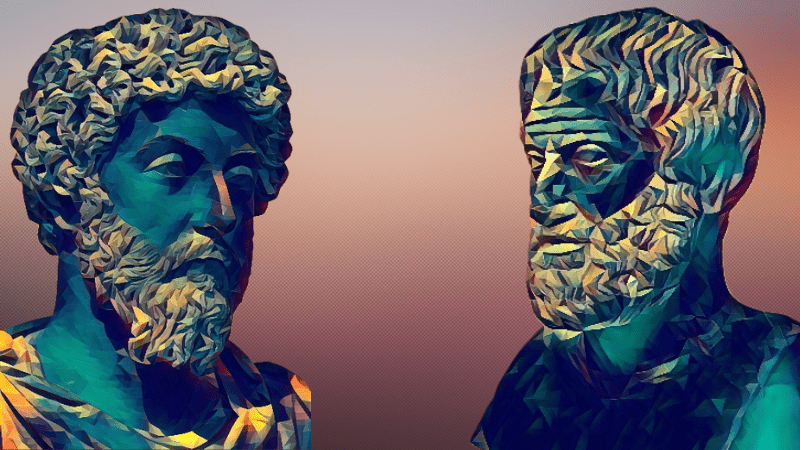What makes a philosopher?
What exactly is a philosopher? This is a question many people ask themselves, and it is not always easy to answer. In short, a philosopher is someone who thinks about the nature of existence and tries to understand the world around them. They use reason and logic to examine various aspects of life, and often explore areas that other people find difficult or impossible to think about. There are many different schools of philosophy, each with their own unique teachings. What all philosophers have in common, however, is a love of knowledge and a desire to find the truth. In this article, we'll learn everything you need to know about philosophy and what makes a philosopher.
A philosopher is someone who...
There are a few key aspects that make up a philosopher. The first is that they think about the nature of existence. This means that they try to understand how the world works and what our place is in it. They often ask big questions like "What is reality?" and "What is the meaning of life?". Another important aspect of philosophy is that it uses reason and logic to examine different ideas. This means that philosophers don't just take things at face value, but try to critically evaluate different concepts. This can be anything from morality to politics to religion.
...offering views or theories on profound questions in ethics, metaphysics, logic, and other related fields.
Philosophy can be divided into three areas:
The first part of the philosophy is the Ethics. This branch deals with the question of what is good and bad, right and wrong. It also examines different moral theories and how we can make ethical decisions.
The second part of the philosophy is the Metaphysics. This branch deals with the nature of reality and tries to understand the fundamental nature of existence. It asks questions such as "What is reality?" and "What is the meaning of life?".
The third part of the philosophy is the Logic. This branch deals with the way we think and reason. It examines various concepts such as validity, cogency, and fallacy.
...a person who knows about philosophy
In short, philosophy is the love of wisdom.
The word "philosophy" comes from the Greek words "philein" and "sophia", which means "love of wisdom". Wisdom is a deep understanding of something that allows us to see it in a new light. It is often about understanding the world around us and our place in it. In philosophy, we try to find answers to the big questions of life. Philosophy is not about taking things at face value, but questioning everything and looking at things from different perspectives.
Philosophy is a way of thinking that is critical and open-minded.
Philosophy is a way of thinking that is both critical and open-minded.
...a person representing the central ideas of a movement, cult, etc.
It is not mandatory, but if you look at famous philosophers, you often find that many of them were loners, outsiders, or even dropouts from society.
Philosophy is often seen as something for people who are not satisfied with the status quo and want to question everything.
This can make philosophy seem like a dangerous or rebellious activity. But ultimately, philosophy is about finding the truth. Philosophy is not about taking things at face value, but about questioning everything and looking at things from different perspectives.
Alan Watts once brilliantly pointed out that any healthy and functioning society must accept a certain number of dropouts. Such outlaws, hermits, gurus and other social misfits play an important role in keeping in mind that life is nothing but a game. Even though the reminder of this is usually very subtle and only available to those who are paying attention, it is vital.
Watts used the concept that life is a game and society is for those who want to play by the rules, while philosophy is for those who question the rules and try to understand why they exist in the first place. Whether they choose to play by them or not.
Here are some other questions that often come up when it comes to philosophers:
- Are philosophers intelligent? Since philosophy requires critical, creative, and analytical thinking skills, many philosophers are intelligent. However, intelligence is not a prerequisite for philosophizing. The mere fact of thinking often and deeply about things can actually increase intelligence.
- Are philosophers smarter than scientists? There is no evidence that one group is inherently smarter than the other. Both philosophy and science are disciplines that require critical thinking. Moreover, one can be a philosopher and a scientist (and vice versa).
- Are philosophers depressed? Sometimes people feel that philosophy makes them depressed because it questions everything they know and believe in. This can be a good thing, because it allows us to think about our beliefs and question whether or not they are true. However, philosophy can also be a way to escape reality. Some philosophers are known to be depressed, but that's not necessarily because of philosophy.
- Do philosophers do anything? Philosophy is a way of thinking and living, but it is not necessarily a profession. Many philosophers have other professions, for example, they teach, write, or work in philosophy-related fields. Some philosophers have no job other than philosophy, but that is not a requirement to be a philosopher.
- What do philosophers wear? There is no dress code for philosophy. Philosophers can wear whatever they want. Often people think that philosophers wear togas or robes, but that is not correct.
- Why can't philosophers write clearly? Many philosophical texts are difficult to read because they contain complex ideas. But that doesn't mean that philosophers can't write clearly. Some philosophers write very clearly and concisely. Others use more complex language to express their ideas.
- For whom is philosophy? Philosophy is for anyone who wants to think deeply about life, the universe and everything. It is a way to understand the world and ourselves. Philosophy can be used to improve our lives and make us better people. Philosophy is not only for intellectuals, but for everyone who wants to understand the world and themselves.
The three qualities of a philosopher are...
The three qualities of a philosopher are: Critical thinking, creativity and open-mindedness.
Philosophers are critical thinkers because they question everything. They want to know why things are the way they are and if there could be a better way. A famous example of the immense power of philosophy is Socrates. He was so critical of the Athenian government and such a good lawyer that they sentenced him to death.
They are also creative because they develop new ideas and ways of looking at the world. This is imperative to go beyond the status quo of what we know and to innovate.
Finally, philosophers are open-minded because they are willing to consider all possibilities, even those that may seem crazy at first. This enables them to find the truth, even if it is hidden behind many false beliefs. If Socrates had been told that the earth revolved around the sun, he would have been open to the idea and would have thought about it.
What Philosophers Have Done for the World...
What philosophers have done for the world is to help us understand it better. By asking questions and challenging assumptions, they force us to think more deeply about the things we take for granted. They also offer new perspectives on old problems and help us see the world in new ways. In short, philosophy makes us better thinkers and helps us better understand the world around us.
The future of philosophy and where it is going
The future of philosophy cannot be predicted, but it is clear that it will continue to be an important part of our lives. As long as there are questions to ask and problems to solve, philosophy will always have a place in the world. And who knows? Maybe one day you'll become a philosopher too!
We have found that modern society needs philosophy more than ever. With the advent of social media, people's thinking is becoming more tribal and they are less able to have sophisticated discussions about complex issues.
Further, more and more people feel lost and alone in a world that moves too fast for them. Philosophy can help people find meaning in their lives and connect with others.
How to become a philosopher
If you are interested in becoming a philosopher, the first step is to read about philosophy. There are many good books that can introduce you to the basics of the different schools of thought.
We have a number of introductory articles such as: "The Best Philosophies for Beginners (Everything You Need to Know)." This is especially handy since it often happens that we dive headfirst into the vast subject of philosophy - which can easily lead to headaches.
Other examples include our articles on beginner-friendly books on specific philosophical schools of thought. Such as: "The 5 Best Books on Daoism for Beginners: An Introduction to the Great Dao."
Once you have a good understanding of the different ideas, you can start thinking about the big questions of life and try to find your own answers. Remember that in philosophy there is no right or wrong answer - just different ways of looking at things. So don't be afraid to think outside the box!
Famous philosophers in history
Finally, here are some of the most famous philosophers in history:
- Socrates: One of the most famous philosophers of all time, Socrates was known for his Socratic method of asking questions to help people see things more clearly. Interested in a sample article? Knowing that you know nothing - Socrates explains
- Plato: The disciple of Socrates, Plato is one of the most influential philosophers in history. His philosophy was based on the idea that there is a perfect world beyond our everyday reality. Here is a sample article for you: Death is not the worst thing - Plato explained
- Aristotle: Another student of Socrates, Aristotle is one of the most important figures in philosophy. He believed in understanding the world with logic and reason, and his ideas have influenced many different schools of thought.
- Lao Tzu: The Chinese philosopher Lao Tzu is the author of the Tao Te Ching, one of the most important works of philosophy. His philosophy is based on the idea of living in harmony with nature. Here is a sample article you can read: Lao Tzu on the flow of life: how to get through life well
- Confucius: The Chinese philosopher Confucius is one of the most famous figures in philosophy. His philosophy emphasized the importance of ethics and morality.
- Gautama Buddha: The founder of Buddhism. People argue back and forth about whether he was a philosopher or not, but his teachings had a great impact on philosophy. His philosophy is based on the Four Noble Truths, which emphasize the importance of suffering and detachment from worldly things. If you want to know, who and how Gautama really waswe have everything for you.
- René Descartes: The French philosopher Descartes is best known for his famous phrase: "I think, therefore I am." He was an important figure in the philosophy of mind and his work was very influential.
- Immanuel Kant: The German philosopher Kant was one of the most important figures of the Enlightenment. His philosophy emphasized the importance of reason and individual autonomy.
- Friedrich Nietzsche: The controversial German philosopher Nietzsche is known for his radical views on morality and religion. He also had a major influence on existentialism and postmodernism. Philosophers are often said to be crazy, but for Nietzsche that was true - at least in his later life. In this article, we take a closer look, why philosophers are often thought to be crazy and which of them really were.
- Jean-Paul Sartre: The French philosopher Sartre was one of the most important representatives of existentialism. He is best known for his philosophy of freedom, which emphasizes the importance of making choices and taking responsibility for them. If you want to learn more about Sartre's conception of philosophy, you should read this article: Jean-Paul Sartre on Being Alone and Why It's Okay
Want to meet a bunch of other famous philosophers?
This way Briefly introduced: The most famous philosophers
As you can see, philosophy has been shaped by many different people from all over the world. Each philosopher has their own unique perspective, and there is much to learn from them. So what are you waiting for? Start reading and thinking about philosophy today! Who knows - maybe you'll become the next great philosopher.
Do you have any questions or comments about philosophy? Let us know in the comments below! And check out our other articles on philosophy for more interesting information. Thanks for reading 🙂







